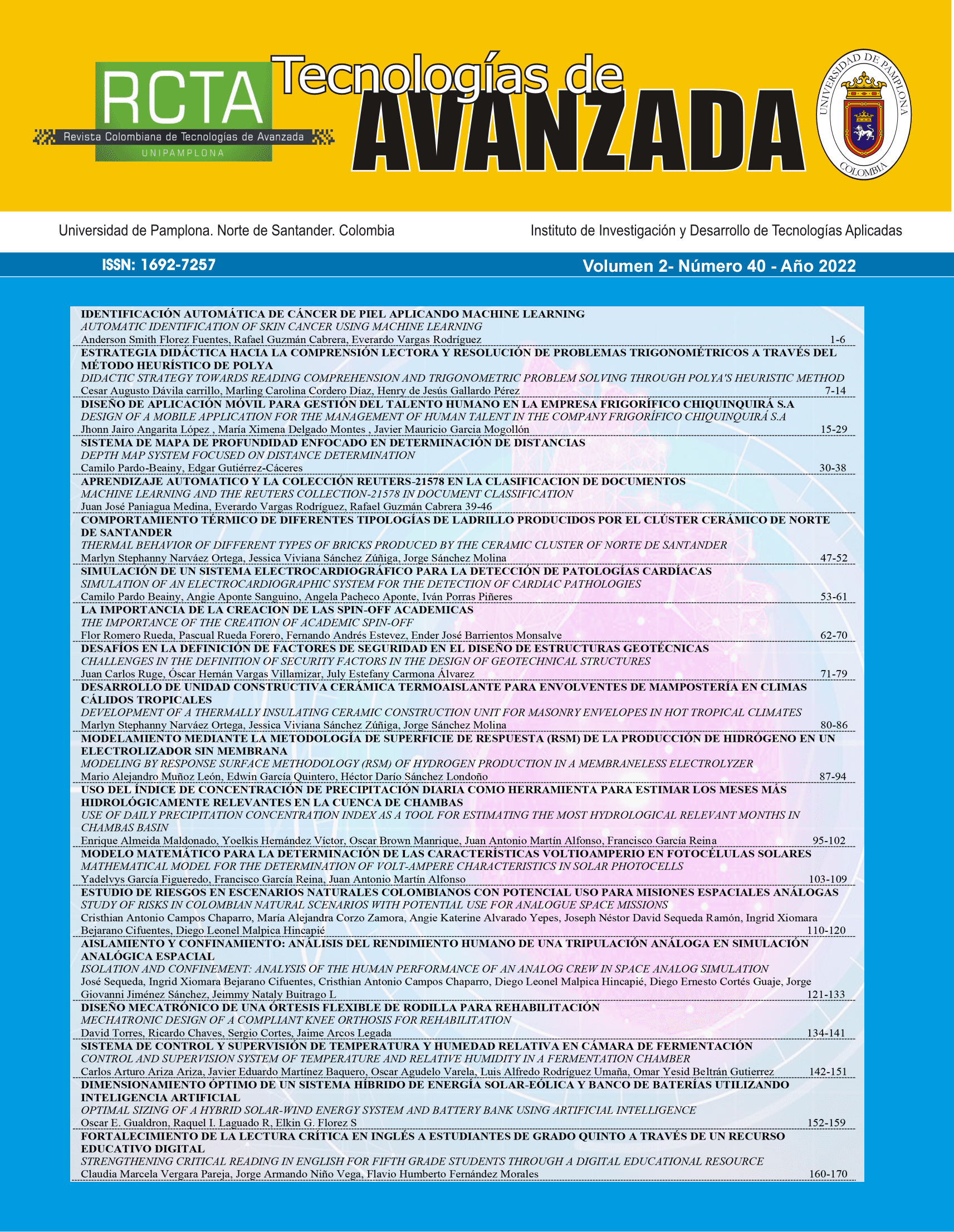Automatic identification of skin cancer using machine learning
DOI:
https://doi.org/10.24054/rcta.v2i40.2350Keywords:
Skin cancer, Machine learning, processing, dataAbstract
Currently the implementation of machine learning in medicine, especially in oncology, has become a key tool for the detection of malformations, infections, heart problems, cancer, among others, anomalies of the human body that by applying machine learning, these processes become tools that strengthen the medical diagnosis. This work presents a literature review and the implementation with Python to analyze the behavior of the implemented data, performing an execution for four types of models such as support vector machine, k-nearest neighbor, Neural Network and Decision Tree, these models are applied to the HAM10000 data, which contains manually labeled medical images, which ensures that the delivery process is effective. In the implementation of a balanced sample, which allows to demonstrate the efficiency of the implementation of machine learning in the identification of skin cancer, this implementation has a great variability in the results, reaching values up to 100% accuracy in the implementation.
Downloads
References
Abdul Hamid, D. S. Bin, Goyal, S. B., & Bedi, P. (2021). Integration of Deep Learning for Improved Diagnosis of Depression using EEG and Facial Features. Materials Today: Proceedings. https://doi.org/10.1016/J.MATPR.2021.05.659
Al-masni, M. A., Kim, D., & Kim, T. (2020). Computer Methods and Programs in Biomedicine Multiple skin lesions diagnostics via integrated deep convolutional networks for segmentation and classification. Computer Methods and Programs in Biomedicine, 190, 105351. https://doi.org/10.1016/j.cmpb.2020.105351
Daneshjou, R., He, B., Ouyang, D., & Zou, J. Y. (2021). How to evaluate deep learning for cancer diagnostics – factors and recommendations. Biochimica et Biophysica Acta (BBA) - Reviews on Cancer, 1875(2), 188515. https://doi.org/10.1016/J.BBCAN.2021.188515
Deng, L., & Yu, D. (2019). Deep Learning Methods and Applications. SpringerBriefs in Computer Science, 31–42. https://doi.org/10.1007/978-981-13-3459-7_3
Dorado-Díaz, P. I., Sampedro-Gómez, J., Vicente-Palacios, V., & Sánchez, P. L. (2019). Applications of Artificial Intelligence in Cardiology. The Future is Already Here. In Revista Espanola de Cardiologia (Vol. 72, Issue 12, pp. 1065–1075). Elsevier Doyma. https://doi.org/10.1016/j.recesp.2019.05.016
Fontecha Pardo, N. A., Quiroga Sarmiento, J. S., nicolas.fontechap@campusucc.edu.co, & juan.quirogas@campusucc.edu.co. (2020). Implementación de algoritmos de inteligencia artificial enfocados en el análisis de los trastornos del estado de ánimo para prevenir futuros suicidios por medio de la red social Facebook. Aprendeia. (22 de 11 de 2020). Obtenido de Https://Aprendeia.Com/Naive-Bayes-Teoria-Machine-Learning/.
Garay, N., Abascal, J., & Gardeazabal, L. (2002). Mediación emocional aplicada en sistemas de comunicación aumentativa y alternativa. Inteligencia Artificial, 6(16). https://doi.org/10.4114/ia.v6i16.743
Gómez Rivas, J., Toribio Vázquez, C., Ballesteros Ruiz, C., Taratkin, M., Marenco, J. L., Cacciamani, G. E., Checcucci, E., Okhunov, Z., Enikeev, D., Esperto, F., Grossmann, R., Somani, B., & Veneziano, D. (2021). Inteligencia artificial y simulación en urología. Actas Urológicas Españolas. https://doi.org/10.1016/J.ACURO.2020.10.012
Hekler, A., Utikal, J. S., Enk, A. H., Hauschild, A., Weichenthal, M., Maron, R. C., Berking, C., Haferkamp, S., Klode, J., Schadendorf, D., Schilling, B., Holland-Letz, T., Izar, B., von Kalle, C., Fröhling, S., Brinker, T. J., Schmitt, L., Peitsch, W. K., Hoffmann, F., … Thiem, A. (2019). Superior skin cancer classification by the combination of human and artificial intelligence. European Journal of Cancer, 120, 114–121. https://doi.org/10.1016/J.EJCA.2019.07.019
Hernández, J. C. (2020). PROBLEMAS ÉTICO-JURÍDICOS DE LAS DECISIONES ALGORÍTMICAS Y EL BIG DATA * Joslay Polanco Medina.
Jofre, M., & Abeldaño, A. (2021). Artificial intelligence: Will replace the dermatologist making diagnoses? Piel, 36(5), 331–335. https://doi.org/10.1016/j.piel.2020.06.003
Koh, J., Yoon, Y., Kim, S., Han, K., & Kim, E. K. (2021). Deep Learning for the Detection of Breast Cancers on Chest Computed Tomography. Clinical Breast Cancer. https://doi.org/10.1016/J.CLBC.2021.04.015
Krishna Monika, M., Arun Vignesh, N., Usha Kumari, C., Kumar, M. N. V. S. S., & Laxmi Lydia, E. (2020). Skin cancer detection and classification using machine learning. Materials Today: Proceedings, 33, 4266–4270. https://doi.org/10.1016/J.MATPR.2020.07.366
Leiva Vazquez, M., Gonzalez Benitez, N., Hechavarria Hernandez, J., Rivero Peña, Y., & Daher Nader, J. E. (2018). El diagnóstico de enfermedades desde el Análisis Inteligente de los Datos.
Maisueche Cuadrado, A. (2019). Utilización Del Machine Learning En La Industria 4.0.
McClendon, L., & Meghanathan, N. (2015). Using Machine Learning Algorithms to Analyze Crime Data. Machine Learning and Applications: An International Journal, 2(1), 1–12. https://doi.org/10.5121/mlaij.2015.2101
Mitchel, T. M. (2017). Machine Learning. In Proceedings of the International Conference on Document Analysis and Recognition, ICDAR. https://doi.org/10.1109/ICDAR.2019.00014
Organización Mundial de La Salud, O. (2021). Cáncer. WHO.
P, T., C, R., & H, K. (2018). The HAM10000 dataset, a large collection of multi-source dermatoscopic images of common pigmented skin lesions. Scientific Data, 5. https://doi.org/10.1038/SDATA.2018.161
Russel, S., & Norvig, P. (2010). Artificial intelligence, A Modern Approach. In 2010 The 2nd International Conference on Computer and Automation Engineering, ICCAE 2010 (Vol. 4). https://doi.org/10.1109/ICCAE.2010.5451578
Saravanan, S., Heshma, B., Shanofer, A. V. A., & Vanithamani, R. (2020). Skin cancer detection using dermoscope images. Materials Today: Proceedings, xxxx. https://doi.org/10.1016/j.matpr.2020.08.388
Yan, T., Zhang, L., & Peng, C. (2019). Intelligent skin cancer diagnosis using improved particle swarm optimization and deep learning models. Applied Soft Computing Journal, 84, 105725. https://doi.org/10.1016/j.asoc.2019.105725
Yin, S., Peng, Q., Li, H., Zhang, Z., You, X., Fischer, K., Furth, S. L., Fan, Y., & Tasian, G. E. (2020). Multi-instance Deep Learning of Ultrasound Imaging Data for Pattern Classification of Congenital Abnormalities of the Kidney and Urinary Tract in Children. Urology, 142, 183–189. https://doi.org/10.1016/J.UROLOGY.2020.05.019
Downloads
Published
Versions
- 2022-07-16 (6)
- 2022-07-16 (5)
- 2022-07-16 (4)
- 2022-08-07 (3)
- 2023-07-19 (2)
- 2023-05-02 (1)
How to Cite
Issue
Section
License
Copyright (c) 2022 REVISTA COLOMBIANA DE TECNOLOGIAS DE AVANZADA (RCTA)

This work is licensed under a Creative Commons Attribution-NonCommercial 4.0 International License.














